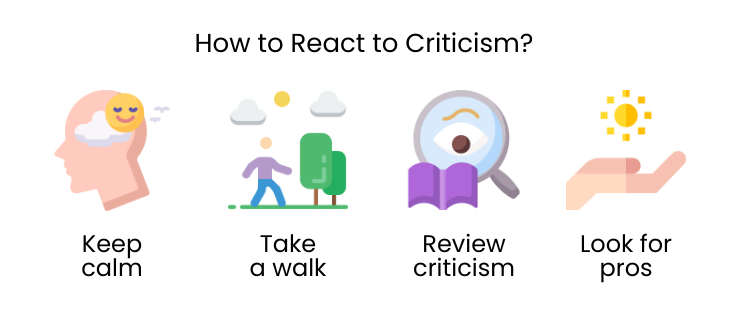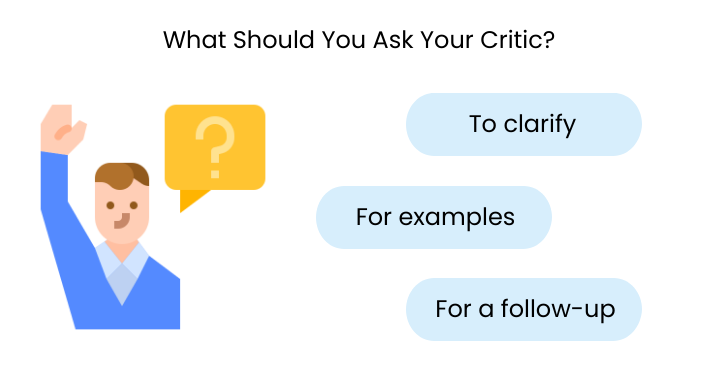How do you deal with criticism? The first reaction many of us have is to defend ourselves, or worse, fight back. We can feel offended, seeing negative feedback as a dismissal of our work. Yet, while criticism can feel hurtful and demoralizing, it can also be viewed in a positive way: it’s an opportunity to improve.
To handle criticism appropriately, students have to learn how to:
- Differentiate between constructive and destructive feedback.
- Deal with the first reaction.
- Communicate well with the person criticizing their work.
- Learn from their mistakes.
In this article, we elaborate further on each tip to help you deal with criticism in college. Our team has explored the techniques you should use to control your reactions and perceptions of negative feedback.
1. 🔎 Recognize Constructive Criticism
Learning the difference between constructive and destructive criticism is the first step to being able to deal with any of it. You should understand the intentions of the assessor and where the feedback is coming from. We’ll discuss how to do this in the section.
In short:
Constructive criticism is, ideally, meant to help you. Destructive criticism is only intended to hurt. But how do you differentiate between them?
Once you realize the difference between feedbacks, it becomes clear why you should pay attention to constructive criticism. It will help you improve your performance by revealing your mistakes and changing your perspective.
Features of constructive criticism include (with examples of peer-review):
- Accurate and thought-out viewpoints.
- Provides positive and negative comments.
- Gives comments in a friendly manner.
- Serves to promote academic standards.
In case you receive destructive criticism, you can and should skip it. You’ll see how to handle it in the later sections.
2. ☀️ Don’t React Right Away
Your first reaction to criticism may be to get defensive or recoil without a response. It is natural, but you’re better to withhold these emotions. In this section, we’ll explain why and how to pull it off.
So, what should your first reaction be?

- Keep calm: It’s okay to feel defensive when somebody criticizes you or your work but letting emotions get the better of you will not help the situation. Try to remain calm, even if the person seems agitated. Responding to criticism in an emotional way might come off as an inability to handle feedback. Take a few deep breaths and smile lightly to stay calm.
- Take a walk: If your response to criticism is to get defensive or angry, take some time before reacting. One of the effective ways to cool down is to take a walk. The time will allow you to think beyond your initial reaction. If it’s not possible at the moment, skip this step.
- Consider the feedback as if it wasn’t directed at you: Imagine that the criticism isn’t about your work or performance but someone else’s. This distancing can help you deal with emotions and look from a different angle. Do you think criticism is constructive? Try to assess it as objectively as possible and understand whether feelings or facts drove the critic.
- Look for positive aspects: When somebody is criticizing your work, try to find benefits in it. No matter how demoralizing the comment sounds, you should seek what your critic liked about your work. Did they mention any positive aspects? Why did this person spend their time explaining their opinion and listing your mistakes? Did they wish you do better next time? See it as an opportunity to improve.
3. 👍 Treat the Critic with Respect
While we know that it’s not easy to accept criticism, it is essential to be respectful toward the person who gives you feedback. Regardless of what kind of comments you receive, an individual took the time to analyze your work and point out its strengths and weaknesses. In this section, we will talk about your initial interaction with your critic.
Here are some tips on staying polite to get the maximum benefit from the feedback:
- Don’t interrupt. Yes, this basic rule we all know from early childhood is indeed crucial. As you are receiving feedback, never interrupt your critic. Firstly, it’s disrespectful. Secondly, you will confuse the assessor: they may lose their train of thought. Thirdly, you lose your opportunity to gain some useful insights or advice.
- Listen attentively. Remember that the key aim of constructive criticism is to improve the weak sides. Without focusing on the critic’s advice, you won’t reach that goal. Make sure you absorb the information and understand how to implement it. Don’t hesitate to ask for clarifications if necessary.
- Think before talking. You might get too overwhelmed and nervous just after you received the criticism. Then, don’t rush with answering your critic. Take enough time to evaluate the received feedback, analyze the comments, and then decide how to react.
- Repeat the essential comments. Summarize the feedback and restate the key points. This trick will help you to make sure you didn’t miss anything. Also, it eliminates the chance of misunderstandings between you and your critic.
4. 💭 Reconsider Your Work
As you listen to feedback, don’t eliminate the possibility of being mistaken. Try to look at your work from the critic’s perspective and understand their points. Maybe their assumptions are right, and you should reconsider your arguments?
What you should keep in mind is the following:
It’s okay to be mistaken…
People make mistakes – it’s not a secret. And being wrong is a natural thing. The most crucial task is to accept your mistakes and adequately react to them. What’s more, the person who is reviewing your work might be wrong as well. If you feel like the misunderstanding occurred, discuss it with your critic and find the truth out.
… as long as you learn from it.
Bear in mind that being criticized is not the same as being blamed for your mistakes. It’s an opportunity to improve, develop, and advance. View criticism as a chance to expand your horizons and learn something new. Keep in mind all the comments you received, and do your best to enhance your knowledge.
5. 🙋 Don’t Hesitate to Ask
Once you have listened to criticism and realized your mistakes, you can start asking questions. This is an essential step as it helps you to continue polishing your work.

Now, see how to address your questions adequately:
- Ask to clarify:
If you feel like you didn’t get the critic’s ideas, don’t be afraid of asking for clarifications. Since they aim to help you improve, the person will be glad to elaborate. In a friendly and respectful manner, ask for specific details regarding the points you didn’t understand. This will help you to determine your weak sides and to find possible ways of eliminating them. - Ask for examples:
It can be challenging to get someone’s idea until you examine a concrete example. In case of such confusion, ask for an illustration from your work. For instance, your instructor might say that your essay lacks figures of speech. Didn’t you get what does it mean? Ask for an example! They may suggest you write “a white blanket covered the town” instead of “there is a lot of snow outside.” - Ask for a follow-up:
Once you’ve discussed your mistakes, you can ask for more suggestions. Your critic can indicate more problems and help you seek solutions. Do you feel like more questions will appear as you will start polishing your work? Offer your critic to agree on the additional meeting to discuss the further steps.
6. 🤝 Thank Your Critic
Once again, we shall remind you that your critic took their time to examine your work. They indicated your weaknesses with good intentions (if it was constructive feedback, of course). It will be fair if you show your appreciation for their help.
So, why should you thank your critic?
Because:
- the person devoted themself to your work and spent their time;
- the critic’s pieces of advice might be of crucial significance to your work;
- with a simple “thank you,” you can establish a good relationship with the critic;
- their criticism lets you view your work from a broader or a completely different perspective;
- your words of gratitude will demonstrate your respect and appreciation towards your critic.
7. 😔 Don’t Take It Personally
Criticism can be incredibly tough to hear—you should learn how not to take it personally. Constructive feedback on work concerns only its qualities, not yours. If your critic offends you personally, you can ignore them without a doubt. It means that the criticism is destructive, and the person is not qualified.
Here are several tips on accepting criticism without taking it personally:
Step 1: Separate your work from yourself.
As you accept criticism, don’t overthink or add any implications. The person is indicating the flaws you have in your work, not in yourself. Moreover, the fact that there might be some mistakes doesn’t make you unqualified. Once you’ve dealt with the problems, you can easily avoid making them again.
Step 2: Think of your critic’s intentions.
It is essential to understand that your assessor desires to help you. Nobody is trying to offend or blame you. Instead, the person who criticizes your work encourages you to improve your performance. Set your mind positively and take benefits of the feedback!
Step 3: Realize that you’re not the problem.
Have you received mind-boggling feedback that makes you question your personal qualities? Talk to your critic and ask them to elaborate on their troubling comments. After a constructive conversation, you will see that your mistakes don’t make you a problem. They only indicate that you need to expand your knowledge a bit.
8. 💡 Learn from the Criticism
Finally, we’re moving on to the most crucial point: what do you do with all this feedback. The answer is to correct your mistakes and learn from them. Here we will tell you how.
Consider every step you should take to learn from the criticism:
Criticism can be hard to deal with, especially if you believe that you can do no wrong. In that case, you should remember that mistakes that we make and how we deal with them make us better. Being aware of our flaws and creating a plan to improve will help you become an expert in the field.
9. 🐘 Develop Thick Skin
This advice is useful not only in accepting criticism and working on oneself but also in communicating with people. You need to be able to control yourself in situations where the opposite behavior is unacceptable. To do this, you need thicker skin, as you’ll see in the section.
Developing one is a long process that requires a lot of emotional strengths from you. Consider our tips that can assist you with that:
- Don’t respond to provocations.
Try not to get overly responsive to negative comments or insults from others. Emotional outbursts won’t do good to you. Instead of reacting, take a deep breath or take some time to calm down. - Don’t focus on yourself too much. Overly concentrating on yourself will make you see your flaws and negative aspects only. Try focusing on your goals and a plan on how to get there.
- Don’t be afraid of looking silly. If you were asked a question and you don’t know the answer, no need to worry. Just ask for some time to think about the answer. You cannot know everything, and that’s okay.
- Don’t react on impulse.
To develop thicker skin, you should learn to be patient and collected. Responding without delay won’t do good to you or another person. - Don’t think others don’t get criticized.
Remember that other people, even the most successful ones, get negative feedback too. They don’t get discouraged by it. Instead, they either ignore destructive comments or improve themselves, using constructive ones.
10. ✋ Ignore Destructive Feedback
Finally, we came to the issue of exploring destructive criticism. Just to remind you, this is a kind of feedback that isn’t intended to help you and isn’t based on facts. So, don’t take it seriously, or better, ignore it. We will explain to you why.
First and foremost, let’s figure out how to understand whether the feedback is destructive. If you feel like the person’s comments are offensive, you might become a victim of toxic criticism.
Here is a small trick from us:
Use the put-yourself-in-person’s-shoes method. Imagine yourself in the critic’s place and try to understand why they provide such unreasonable feedback. Figure out its roots to see whether it’s indeed destructive. To compare with constructive feedback, you can go back to the first section of the article.
In case the comments from the critic are indeed inadequate, react accordingly:
- Thank them, but no.
Saying “thank you” for any comments is the right thing to do. After all, you are a polite person. Yet, let the critic know that you don’t need their advice. Nobody has a right to make you feel inferior by leaving toxic judgments. So, calmly listen to the comments, but demonstrate that you are not expecting further advice. - Remain confident.
Believe in who you are, and don’t let any unqualified critics affect your self-worth. Your work may have some flaws—everybody makes mistakes. If somebody openly and offensively questions your knowledge, stay confident and defend your position.
Remember how much time and effort you put into your work. So, accept only logical and reasonable comments. Realizing your real power, you will get motivated for further achievements. - Disagree politely.
It is fair to defend your position as long as you do it politely. When you disagree with your critic, don’t be afraid to state your viewpoint. In a calm and friendly manner, explain why do you think your ideas are logical. Don’t forget to provide some valid evidence to make your arguments even more substantial.
Disagreeing with destructive criticism has a double benefit. Firstly, you remain faithful to your position and develop your self-confidence. Secondly, you give your critic a chance to realize their mistakes after viewing the issue from a different angle. - Diffuse the tension.
Does it seem like the critic is too aggressive? Try to diffuse the situation. This might be quite challenging, so here is a tip from us.
Analyze what the person says and try to find at least something you can agree with. For instance, the critic states that you demonstrated poor writing skills in your essay. Maybe your paper indeed has some flaws? What if it lacks examples? Say that you will work on your writing more and fill it with appropriate information. Remain calm and ignore the parts where the critic was rude. Yet, release the tension by restating and considering at least a tiny piece of the critic’s advice. - Ignore it furthermore.
Can’t find any basis for the criticism? Then, the comments are entirely destructive. The best way to deal with them is just to ignore them.
We realize that forgetting negative feedback can be difficult. Take your time and try to switch your attention to something more pleasurable. And the last piece of advice: remind yourself that you are not worth unreasonable criticism caused by someone’s jealousy or anger.
That’s all! We hope that after our advice you will easily accept criticism and learn from it. Share this article with those who may need such advice.
🔗 References
- Constructive Feedback Principles, Academic Quality and Standards: the University of Tasmania, Australia
- How to Stop Taking Criticism So Personally: Stacey Lastoe, The Muse
- How to Accept Criticism with Grace and Appreciation: Leo Babauta, zen habits
- Criticism, A Quarterly for Literature and the Arts: WSU Press, Wayne State University
- Providing Feedback to Writers: The Writing Center Guides, George Mason University
- Getting Feedback: The Writing Center, the University of North Carolina at Chapel Hill
- Revising Based on Feedback: Academic Guides at Walden University
- Asking Questions to Improve Learning: Center for Teaching and Learning, Washington University in St. Louis
- Four Ways to Constructively Criticize Yourself: Juliana Breines, the Greater Good Science Center at the University of California, Berkeley






![41 Top Study Blogs for Students in College [2026 Upd.]](https://custom-writing.org/blog/wp-content/uploads/2020/12/students-in-a-library-284x153.jpg)





I love the list of references! I think this is inspiring and quite insightful!